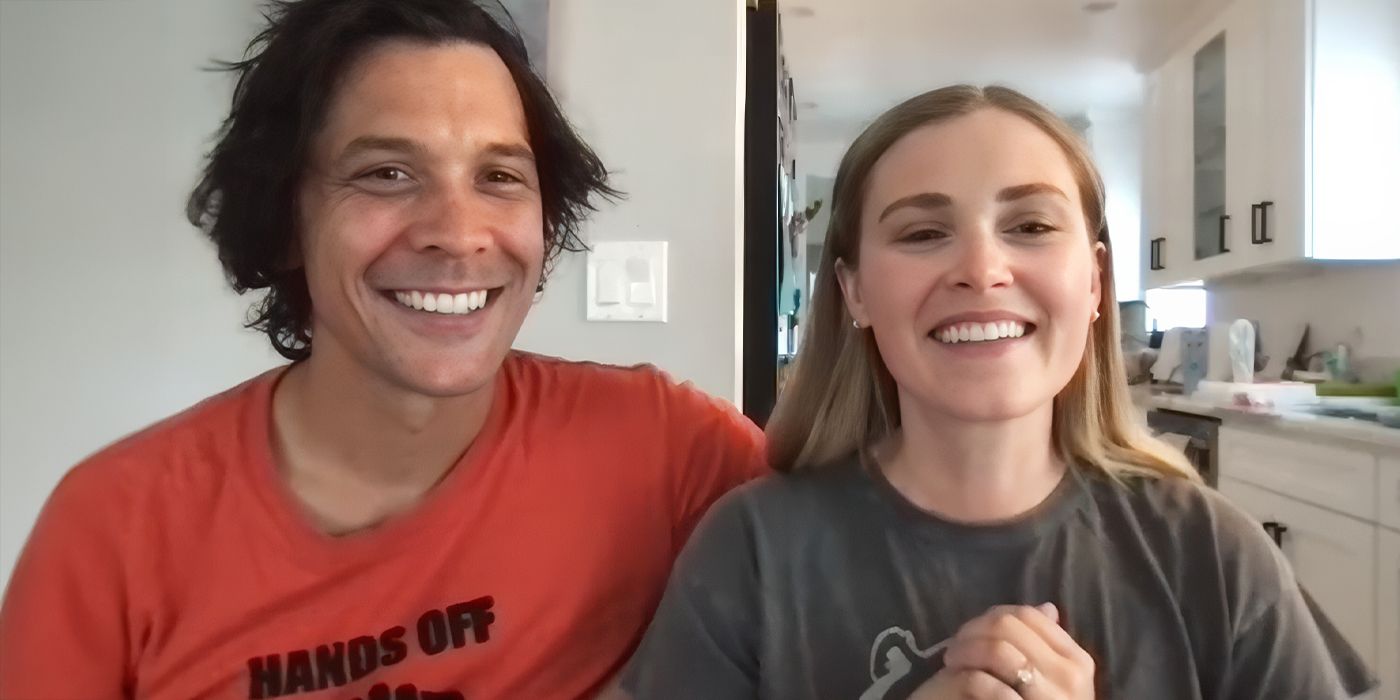You may know them best as Clarke and Bellamy from the hit CW series The 100, but married acting-directing-and-writing duo Eliza Taylor and Bob Morley have got some new tricks up their sleeves with their twisted horror comedy Status: Active. While Taylor and Morley have both made appearances on the small screen since The 100 ended in 2020 — Taylor featured in several episodes of the gone-too-soon Quantum Leap reboot and Morley starred in Hulu’s romantic drama Love Me — the married duo were eager to work together on a new project — enter, Status: Active. Born from a shared idea, and a shared desire to create their own dream roles both in front of and behind the camera, Status: Active follows Taylor’s Kaitlyn, an Instacart shopper who crosses paths with a killer.
I recently sat down with Taylor and Morley to discuss all things Status: Active, including their plans to turn the short into a full-length feature film. During our in-depth conversation about the twisty, genre-bending short, Taylor and Morley spoke at length about writing, directing, and starring in their own project, what drove them to make Status: Active, and what they plan to create next. They also spoke about the incredible talents of the rest of the Status: Active team, how they managed to capture various tones and genres within the less than 10-minute movie, and why they wanted to make a film that speaks directly to the gig economy. You can read the transcript for our conversation below or watch the interview in the player above.
COLLIDER: Bob, you both wrote and directed this. So, where did you get the idea for this story, and what made you want to make this project?
BOB MORLEY: So the story kind of came from both of us. Eliza and I are both credited with the story. I just did the copy. It was born out of just wanting to make something finally.
ELIZA TAYLOR: We just really wanted to work.
MORLEY: To condense the long story – I was going to direct, then COVID hit, then we became parents. And then I was like, now we have a toddler, I feel like we have the bandwidth to be able to start writing and directing stuff again. And so, we just kind of built on character. We started off with Kaitlyn.
TAYLOR: Basically, we hadn’t had any auditions in months. And, we were just like, “What is going on?” And then we both said, “That’s it, let’s make something ourselves.” And Bob went, “Well, what kind of role do you want to play?” And I said, “Well, I want to play an adult woman.”
MORLEY: So I went, “How about a robot shopper?”
TAYLOR: Or an Instacart shopper.
MORLEY: Then it kind of lent itself to that drive engine, and Eliza was like, “They do stops now, it’s like a murdery thing.” I was like, “Let’s add the element of the stakes being high” with the rating and everything like that. I think we just watched a John Oliver episode on service delivery, and how important the rating is, and how unsustainable the whole situation is. So that was fresh in our minds, and we wanted to touch on that a bit.
TAYLOR: And then within like two days or something, Bob had penned it all and written the script, which was amazing.
MORLEY: And I think also for me, coming from a directorial place, it was like I wanted to do a comedy, a horror, and a very cinema verité type film. So I was trying to mash three genres together. So when you’ve got five minutes, three genres, and the story, it’s easy to whack it all together. But to make it cohesive was a little bit challenging, but I think that’s where Eliza’s performance came in, and I didn’t have to give her any direction.
TAYLOR: Thank you.
Eliza Taylor & Bob Morley Relished the Freedom of Creating an “Us-Driven” Project Together
“Bob got to just fly with completely his own direction, which was just awesome to see him completely untethered.”
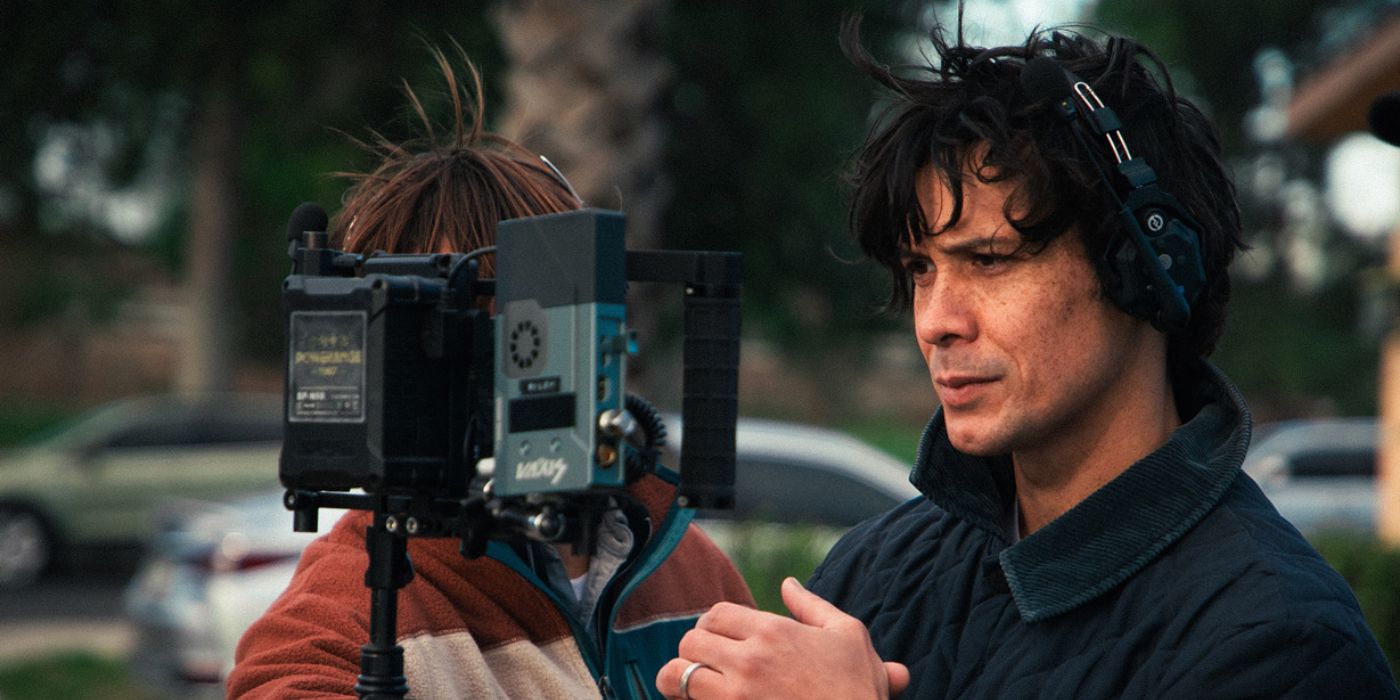
It does all come together really beautifully, and this isn’t your first time directing Eliza. You directed an episode of The 100.
MORLEY: Yeah!
What’s something that you learned during that initial directing experience that you brought with you to Status: Active, and then, what’s something that you learned while doing this that you’re going to take to your next directing project?
MORLEY: Yeah, I think that one of the big things that I learned when I was working on The 100 was shooting for your edit. We both went for the Warner Brothers Director’s workshop. And so that was one thing that was really drilled into you. And I think it’s something that’s super important, especially when you’re working for a network, is to make sure you get all your coverage and everything like that. So in effect, it makes you quite an efficient director.
And then working on that side of things, when you’re working for a network and studio, you have to make sure you cover everything. And then on the absolute opposite end, where you’re self-financing and it’s a totally independent feature, there is a lot more leeway in terms of the story you want to tell, but it just meant that I’d have to go home and rewrite the script, so I had the most authentic script. It was kind of opposite ends of the spectrum of what we’re shooting in terms of being a studio-driven thing, and then a very independent—
TAYLOR: An us-driven thing. Yeah, it was very different. When it comes to working for a big studio like Warner Brothers or a network like the CW, you’re very beholden to the vision that they have a continuity that needs to be on it. Whereas this was really cool because Bob got to just fly with completely his own direction, which was just awesome to see him completely untethered.
MORLEY: Working with a DOP that could handle those three different types of looks, it was important to find the right person for that. And we’re very lucky with our producing team.
TAYLOR: Oh, my God, our producer, Alyse Kane Riley. She’s a badass female entrepreneur. She is a one-stop shop for production. She completely held our hands through the whole thing.
MORLEY: She pulled all the right people together.
TAYLOR: She was amazing, so I have to mention her.
MORLEY: So that’s something that, if I get to do another production, that’s something that I’ll take with me for sure. It’s like learning that balance – it was great to have that experience in both worlds of independent filmmaking and then working for a studio, one thing that I probably wouldn’t do again is write something that’s set in a car. That was very hard to light, hard to shoot. Very frustrating.
TAYLOR: Very limiting.
Eliza, similarly for you, what’s something that you learned during this process as an actress that you’ll take into your next role?
MORLEY: Nothing.
TAYLOR: You always learn something! For me, I think we wrote Kaitlyn to have a lot of my weirdness and my quirks. And I’ve never gotten to portray that in a character before. I’ve never gotten to play any of my weirdness. And so I just kind of let it all hang out in this, which was really, really liberating and fun, because Kaitlyn is such a quirky character and it just inspired me to just add a little bit more of that to my future roles as well. It was just really fun.
I love all the choices that you make as Kaitlyn, because she’s very relatable for anyone who’s had to do DoorDash before, and she’s equal parts charming, but a little bit like – and I mean this as I compliment – a little bit of a dirtbag.
MORLEY: Yeah, yeah, totally.
TAYLOR: I’m so glad you said that, because that’s exactly what we wanted it to be.
How did you go about fleshing her out?
MORLEY: I feel like she really came together when we picked out her outfit.
TAYLOR: That’s what I was going to say as well. We had an outfit that I had kind of put together from my own clothes that we realized we couldn’t use because there was a big logo on the front that we had to license. So we went to some thrift stores in Burbank, and when we found the onesie, the romper with the dragons on it.
It’s so cool.
MORLEY: It is really cool! I was like, “Let’s just see how this goes.”
TAYLOR: This is the vibe. This girl’s a little…this is quirky. And as soon as I put that on and I had the glasses and my little fanny pack and the shoes –
MORLEY: And you got the glasses at Goodwill, remember?
TAYLOR: Yeah, I did! She really came together then.
MORLEY: The fanny pack is actually –
TAYLOR: Actually, our son’s.
Aw, that’s so cute!
MORLEY: I was like, “Let’s get that one.” And I was like, “And then we can match it with the smiley face on the phone.”
TAYLOR: Yeah, the popsocket on the phone was intentional. We wanted her to have this thing about smiley faces. She’s just a little kooky.
MORLEY: And I also think the car was a big story.
TAYLOR: The car is a big storyteller, for sure. It tells you who she is. Thankfully, our friend Aaron lent us that car, and we didn’t need to do anything to it. That’s just how he drives it around.
MORLEY: Yeah, he sent me a video like, “Aw, I cracked the windshield.” He’s like, “I’m sorry.” I was like, no, no, no, it’s perfect.
That adds to it.
MORLEY: That was the bane of our existence, that car, but also by the end of it, I was just in love with it.
TAYLOR: Yeah, it’s iconic.
Morely’s ‘Status: Active’ Cameo Wasn’t Originally in the Script
“I was like, ‘Okay, but only if it doesn’t take up too much time.'”
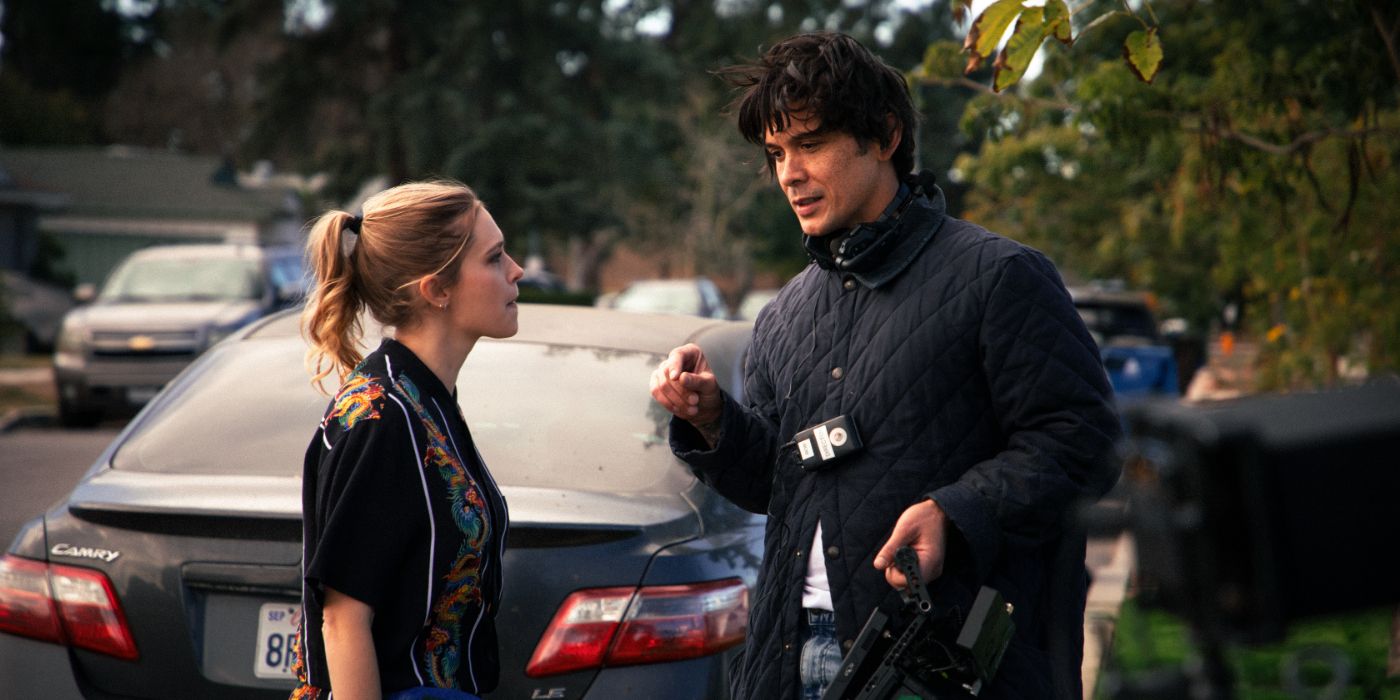
I love the little flirtatious moment that you guys have in the grocery store. Can you elaborate on having yourself in that little cameo and just having that little moment for you guys? I was immediately down for a full-length romantic horror comedy from you guys.
MORLEY: It’s funny you mention that because we’re writing it right now.
Amazing!
MORLEY: It’s a pretty funny story, but the moment in the grocery store – because I was going location scouting and kind of drawing my map of how I was going to shoot that – and Eliza was just like, “You have to make a cameo.” I was like, “I’m not, I’m not.”
TAYLOR: I was like, “You have to be in it.”
MORLEY: And I was like, “Yeah, alright.” And so I wrote him in and I wrote him as in, as “The Handsome Shopper.” It was just like that moment’s supposed to be a bit like a “meet cute.” And then I had to catch her doing her armpit stuff, which was quite funny. I love all those little vignettes within the short, and they really give us a place to move when we’re developing the feature as well, you know? That kind of just came out of Eliza saying, “You’ve got to be in it.” I was like, “We can do this,” but I was more like –
TAYLOR: It wasn’t in the original script. It was very last-minute.
MORLEY: Yeah. And so that was one of those things where I had to write and then send it off to the department heads, but I was like, “Okay, but only if it doesn’t take up too much time.” So I created a shot that kind of wrapped around both of us, that was all in the one shot. But yeah, there’s some pretty funny outtakes around. You were pushing the trolley, and I was trying to give you notes, and the DOP is like, “Bob, just get out of the shot and give her the notes so we can use it.” It’s like, “Oh, sorry.”
That’s so cute. I love that whole sequence of her in the grocery store, because it’s so fun and there are so many bubbly levels to that moment. You get the later scenes with the sort of more horror edge to it, and it takes on a completely different turn.
MORLEY: Yeah, it’s pretty bonkers like that. That was the intention, absolutely, and even with coloring, when we’re going through with our colorist, Roy, it was trying to do different genres in the whole thing. But when you watch it, it’s a pretty crazy ride through nine minutes of like active, inactive, saturated, and horror palette and all that stuff. That supermarket was our last day of shooting, and it was quite fun even though it was a night shoot.
TAYLOR: We had to shoot obviously outside of the supermarket hours. So we started that sequence at 8 p.m. and we finished at 6 a.m. I know that for people – friends of ours who read the script – the one thing that they were super excited to see, almost excited to see come together, was that supermarket sequence and that spaghetti western standoff.
MORLEY: It was one of the clearest things that I had in my head in terms of how I wanted to shoot.
TAYLOR: And that was actually born from how much I love grocery shopping.
MORLEY: Yeah, you do.
TAYLOR: I do. I really get excited.
It’s fun! Speaking of, you mentioned the colorist. I really loved the color grading choices that you guys made and how that lends itself to the tone of each part of the feature. Talk a little bit more about making those choices of the vibrancy versus the desaturation.
MORLEY: Yeah, definitely. We wanted to see the world through Kaitlyn’s lens. And so when she’s inactive, and she’s in her own world, and it’s somewhat muted, and it’s not as exciting, and even when she’s delivering groceries, it’s still a little bit dull. But when she’s active, she’s got motivation and a place to go. And this supermarket itself, especially when she’s spending other people’s money and just living in her own dream world, it can pop. Let’s make it happy. Let’s make it pop. And she’s feeling really badass. And the music choices come in as well. And then to try and shift it slightly tonally as we go into the horror part of it all, it’s like it happens subconsciously, and you’ll notice the notifications aren’t really coming up as much, or there’s just a shift in color and feel. And so it’s more about placing the audience into that feeling in a subtle way, hopefully subtle. And then we return to the color, the vibrancy, very slightly at the end. But yeah, it was definitely the intention from writing it onwards, saying, I want to change the color, the way in which we shoot things, the style we shoot things in.
TAYLOR: In a lot of ways, we wanted this to be like a directing reel – like you’ve got these three different genres, these three very different feelings, so that we could send that off to someone who is looking at you as a director. And say, “Look, I can do this, this, and this.”
Making ‘Status: Active’ Speak to a Demand-Driven Gig Economy
“It’s a pretty grim message. (…) But to look at it through a lens of comedy, that makes it much more palatable.”
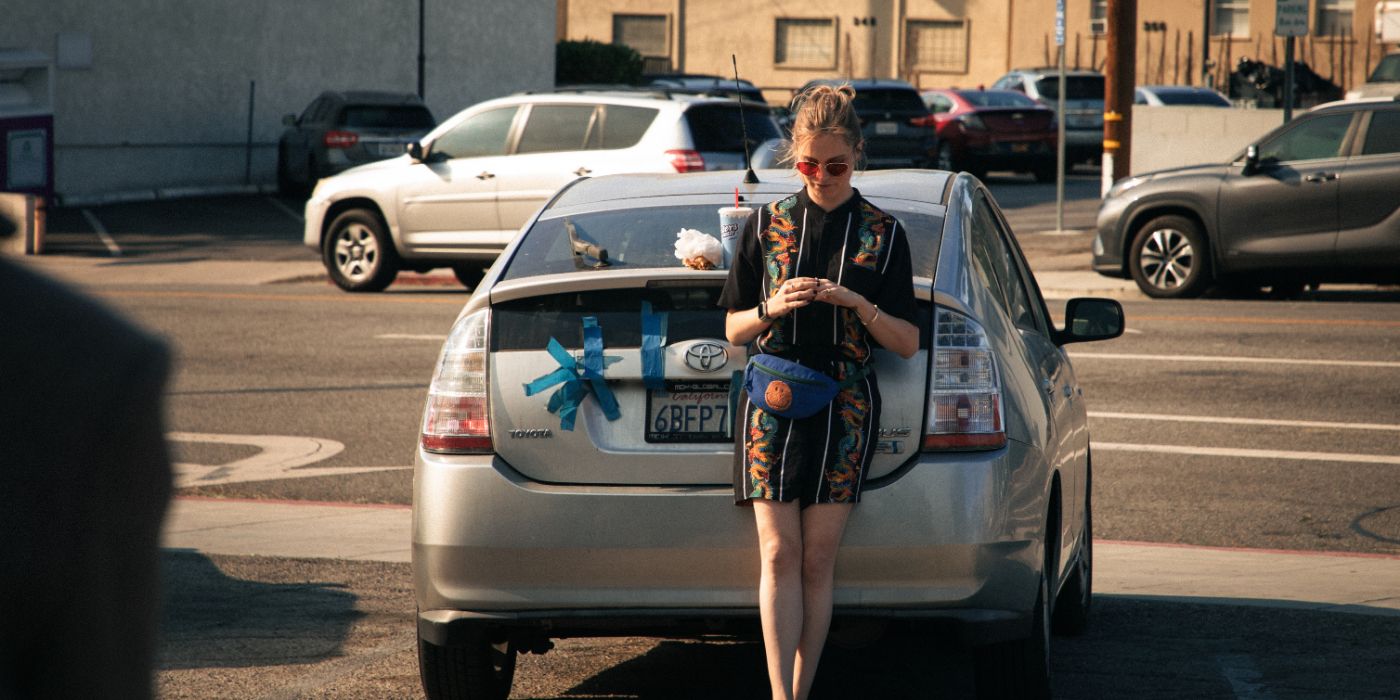
I feel like there’s some really interesting commentary also in the story, just about the way that capitalism sort of pushes us to sometimes turn a blind eye to some things. With Kaitlyn, she has that very grim run-in with her last customer.
MORLEY: I love your reaction at the end there. It’s brilliant. But yeah, it’s definitely something we wanted to hit on like that. We always said the second lead of the short and of the feature is her phone – that is the thing that drives her. It gives her motivation, validates her. That is the thing that is pushing her forward. But it also is a thing that distracts from what’s actually happening in real life.
TAYLOR: It’s definitely something that is reality for everybody these days. So we did want to kind of hang a hat on that.
MORLEY: But even like her behavior in the supermarket when she’s shopping for someone, there’s this spark between two people, but she’s like, “I’ve got a job to do. My phone says I have to get this,” or she’s like, charging at another woman to grab the last packet of ramen – politeness is out the window, because the phone says you need to do this. So definitely there’s that part of the gig economy and how it can kind of make you just have the blinkers on and just do what you need to do and ignore everything else. But also that fixation on your phone. It’s kind of crazy when you think about it, and how the things we think about are dictated to us by our algorithm. And so that’s kind of an ode to that or a nod to that fact.
TAYLOR: Yeah, I think that’s the overarching theme of the short, if there’s a deeper message underneath it, that’s what it is.
MORLEY: It’s a pretty grim message. We started like a poem, like it’s pretty dark, like Eliza’s got a pretty dark mind story. But to look at it through a lens of comedy, that makes it much more palatable. It’s something that we do want the audience to go, “Oh, that was fun, but it’s actually pretty messed up.”
TAYLOR: And that’s something that we’re really getting into now that we’re developing new features. And it is, it’s dark.
MORLEY: It’s pretty dark, but it’s fun. That’s the thing – it’s like Black Mirror, but a comedy.
That’s exactly the sort of vibe that you guys capture.
TAYLOR: That’s a big compliment, thank you.
I love the shot there at the end where she’s taking the picture, and it sort of just lowers the phone. And then you realize, “Oh, this is a bit dark.” That’s a great little moment there. You guys have mentioned a couple of times about working on the feature. Can you speak any more about working on that and what we can expect from that project?
MORLEY: So right now we’ve been submitted to short film festivals, and we’re developing the feature length and the lookbook with the intent of going to the festivals and going, “Hey, do you like this? Here’s the feature and we’re ready to go and we’ve got this all set up,” to anyone who likes it. But as I was saying, with the feature, we have more time to learn to love Kaitlyn and how the world works and the world that she lives in, and explore those things a little bit more in depth.
TAYLOR: And also, we want people who are working in this industry to feel really seen, and like that’s not just Instacart shoppers, but it’s UberEats drivers, and it’s Amazon delivery drivers, and it’s Wag people walking dogs. And we kind of want to bring all of those people into the world.
MORLEY: And we’re talking about the ending of it and just how this gig economy has kind of gotten out of control. I think it’s really numb to a lot of people – how to interact with each other. So I know, even possibly exploring the dating apps, I know that’s been done a lot. It’s just that other dissociation to your fellow human being.
TAYLOR: And what started as a very fun little project for us – it wasn’t at first when we were writing the short, we weren’t thinking that this was going to be proof of concept for a feature – but I think we and everybody who has viewed the film since, has fallen so in love with Kaitlyn and in this world that they want to see more, and we want to explore more.
MORLEY: I definitely want to see more of Kaitlyn, what you do with her.
TAYLOR: It’s turned into a real passion project, and now I can’t imagine it not being a feature, which is really cool.
MORLEY: But it’s good! We were just going through and breaking down all the different acts in it just today, really sorting that all out.
TAYLOR: This is new for us.
MORLEY: We’ve started – we’re actually writing together. Today was our first day writing together. It’s been good, it’s been very good. We’ve got a bit of a deadline ahead of us, especially if we get into the festivals we’re hoping to get into. So to have that already in our back pocket to go, “Here it is. This is the outline. Get on board.”
TAYLOR: “Feel free to fund it.”
MORLEY: That’s what is ahead of us for Status: Active and Kaitlyn for these next couple of years.
The feature is the marathon event, and so we’ll keep pushing for that.
Taylor & Morley Have Already Written Their Next Short Film
“It’s a romance story about what lengths you would go to for the one you love. It’s set in the 90s.”
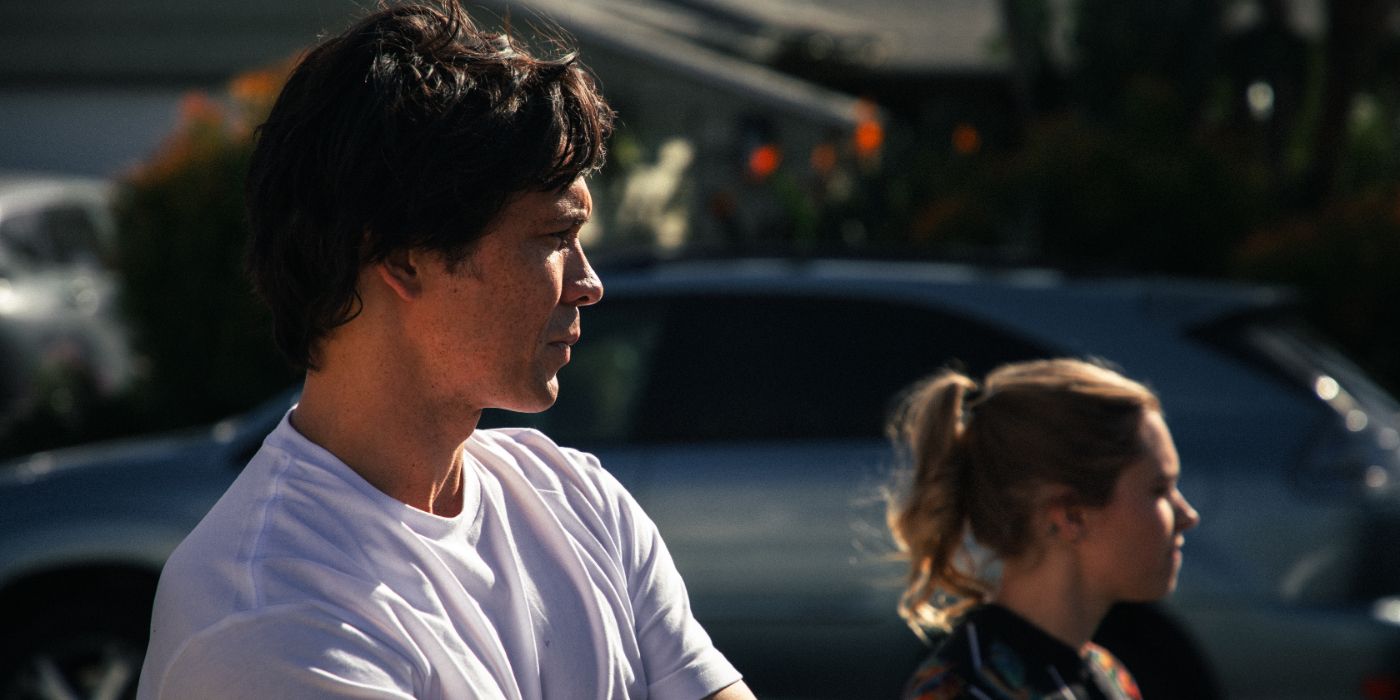
You mentioned that you’re writing together, you’ve obviously worked together before, and quite well. How has it been evolving your working relationship, first on the short and now on the feature?
TAYLOR: I think it’s good. I mean, it’s like we’re sort of in the teething phase of figuring it out – how we’re going to write as a team –
MORLEY: And when! What time works for us, who does what when. We both get inspiration at different times of the day.
TAYLOR: I’m a morning person, he’s an afternoon person. It’s really cool to be problem-solving and learning each other’s styles so that we can meld them together.
MORLEY: We actually just wrote another short for you to direct. We finished that…
TAYLOR: Yesterday.
MORLEY: Was it?
TAYLOR: Yeah.
That’s awesome!
MORLEY: It’s cool. After we finished doing Status: Active, because Eliza directs as well, I was like, “Well, let’s write another one so you can direct.” But she’s not going to cast me in it. That’s film for you.
TAYLOR: I’d be happy for you to be in it!
MORLEY: I was like, “Oh, I don’t know if there’s anything in this for me.” And you’re like, “No.” What a waste of time, right? But yeah, we’ve done some writing together, but with the feature, I think like we said, we just started.
TAYLOR: We’re in our infancy, but it’s exciting. We do work together really well. We have done for so many years now. And it’s just an excuse to hang out more.
I love that. I always want to hang out with my wife too, so I get it.
MORLEY: It’s kind of the best thing.
TAYLOR: It is.
What can you say about the other short that you’re working on? I would love to hear more about that as well.
TAYLOR: It’s another dark and twisted comedy.
MORLEY: It’s a romance story about what lengths you would go to for the one you love. It’s set in the 90s.
I love all those words.
MORLEY: It revolves around a talk show host, basically.
TAYLOR: Like a Jerry Springer-esque type.
MORLEY: So like love, obsession, entitlement. That kind of stuff. Once again, this one was just
like, “And then they can do this.” And I was like, “You’re twisted.”
TAYLOR: I don’t know where it comes from!
MORLEY: I was like, “Okay!” She writes stuff that she wouldn’t want to watch.
TAYLOR: It’s true. I don’t like horror. I don’t like people who like doing weird stuff or getting hurt. I want to watch sweet, sweet baby comedies.
MORLEY: Rom-coms.
TAYLOR: Give me people in love.
MORLEY: But when it comes to writing, there’s something going on in here (referring to Taylor’s head).
TAYLOR: It’s true.
MORLEY: So that one is a love story, but it’s very twisted. And I think it touches on entitlement and being an obsessive fan of a celebrity.
TAYLOR: Yeah. Idolizing a celebrity.
That sounds really cool. Any production, big or small, doesn’t come together without a number of talented cast and crew, both in front of and behind the camera. So I’d love to give you guys a minute to sing the praises of the folks who worked on this project and the supporting cast, as well as the people whose names we only see in the credits – which, I love the style of the credits being the notifications.
MORLEY: Yeah, our VFX guy, Andy Ramirez, he works out in New York, and yeah, we worked quite a lot. There were a lot of sessions about how those notifications should come about, and they played a huge part in it, too.
TAYLOR: A huge part. He did a phenomenal job. And Andy Young, our editor who –
MORLEY: He works on a Batman series. He was nominated for an Emmy just recently.
TAYLOR: He’s incredible. And he just happened to respond to the script. We put out a call online for editors, and he read it and loved it, and we watched one of his shorts that he edited, and we went, “Yeah, I think he’s our guy.” But we had no idea just how well we would work with him and how amazing he was.
MORLEY: Yeah, I wanted him to do everything. Andy Young is a legend. He had a look at our lookbook for it as well, and all the references that I put in there were things that he’d seen before that he was really into. That was a match made in heaven. Justin Riley, our DP.
TAYLOR: Married to Alyse, our producer, which was nice.
MORLEY: We had a lot of couples on that! Tim Deal and Alexis, that was another couple there on the short.
TAYLOR: Tim was our first AD whom I worked with on Quantum Leap, and his fiance, Alexis, who also did sound on Quantum, so she came and did sound for us as well. We have a lot of happy couples on set.
MORLEY: A lot of it was calling in friends. Levi Maiden.
TAYLOR: Levi Maiden, who was on an episode of The 100 in 2014.
MORLEY: Season 1, yeah.
MORLEY: Mal Berglund, we’ve both known for decades.
TAYLOR: Years. She’s an Aussie actress who’s hilarious. Just such an amazing comedic actor. She played the other robot shopper who I have the stand off with. Carlos Prats, who played the clerk at the hardware store, who we’ve known for a year or so now, maybe two, but he is awesome.
MORLEY: He’s just a sweetheart.
TAYLOR: We love to help each other with auditions from time to time. So we brought him on board.
MORLEY: It was very humbling. How willing our friends were willing to join in just to help us out. I think that we all have started off somewhere before, and I think I’ve missed making indie stuff or real guerrilla style things, and it was a nice return to that.
TAYLOR: It was.
MORLEY: Aaron Jacob Benko, thanks for his car. Our dog Panda, she makes an appearance. Who else? Roy Sun, our colorist, was just a magician. That was cool, because I know I’ve never really gone through those sessions before, so everyone was quite gentle with me because I was like, “I want to come in and do in-person because everyone’s doing remote.” So I kind of made a point of going in and seeing everyone, and learning as much as I could.
TAYLOR: It was a big learning curve with all that stuff. Sound mixing, coloring and just editing. It was really interesting to watch.
MORLEY: But basically everyone you see in the credits deserves to be mentioned because they’re incredible and we’d work with them again in a heartbeat. It was good.
TAYLOR: It was cool. And then we have to give a massive shout out to everyone who donated to our IndieGoGo. We did some crowdfunding and our fans really stepped up.
MORLEY: Yeah, it’s quite amazing. And that’s allowed us to apply to a bunch of different festivals and help us finish on VFX.
TAYLOR: Yeah, we got to finish the film because of them.
MORLEY: Just through an unfortunate series of events, the days that we booked out to shoot happened to be the days that the LA fires started. And, so many of our shots needed to be rotoscoped because it looked smokey, like LA was burning down. We were very fortunate that our cast and crew were able to still shoot in a very safe manner. Thankfully, Eliza and I have fans that helped us out in such a huge way, we were able to kind of fix up the shots and keep moving forward.
‘Status: Active’ Could Come to a Film Festival Near You
“We’ve applied to all the big ones, kind of like a Hail Mary, because this is our first time doing it.”
I know you guys are planning to take this to the festival circuit, so where can we expect to see you guys pop up?
MORLEY: I hope everywhere, we’ve applied to all the big ones, kind of like a Hail Mary, because this is our first time doing it. But definitely the majority of them are through the United States, throughout the United Kingdom, and Australia, our home. And I think as time goes on, we’ll just apply for more. But there’s certain ones that we want to go for, and it’s a totally new thing for us, but there’s a strategy, I guess, to putting your film out to film festivals and who gets your world premiere or your international premiere. So there’s all these different premieres that each festival wants. We want to do everything.
TAYLOR: We want to be in all of them. But there is a level of strategy that we need to employ, and that’s been a real learning curve as well.
MORLEY: I want as many people to see it as we can, but it’s like you have to ink it out bits at a time, and then eventually we’ll be able to be like, “Here it is!” On YouTube or whatever platform is the going platform at the time.
TAYLOR: So if you check out our Status: Active Instagram, which is @statisactive_shortfilm, we’ll keep people updated on what festivals we get into so they can get tickets and get out and see it.
There are so many lovely little levels and highlights in this film, and it’s got such a tight runtime, so I’d love to hear from each of you about a particular moment that you’re especially proud of. Maybe it was a difficult shot to get or a challenge you overcame in your performance.
TAYLOR: I think my favorite – which was a really difficult sequence, and we were on a real time crunch – was the stand-off in the supermarket. That’s probably something that I’m most proud of, and proud of Bob for getting the shots he needed for that. It turned out really well, and it’s exactly how I imagined it when it was on the page. So I was just so happy with how that turned out.
MORLEY: It’s funny, when we got this first edit back, and it was just like, “Oh, that wasn’t the shot that I would use,” and this, that and the other, I think – and so stupidly, not stupidly – there’s one shot that I really love, and it’s so inconsequential –
TAYLOR: That is so typical of a director.
MORLEY: But it’s the focus pull on the coping saw at the hardware store.
TAYLOR: Oh yeah, you do love that shot.
MORLEY: And then your hand grabs it. The timing just worked out so well. I was like, “That has to go in now.” I just love a perfectly timed focus pull. And also the grocery store, we covered most of that on Steadicam. And other bits that I really enjoyed were those happy accidents where your sunglasses fell out of your shirt.
TAYLOR: Oh, yeah.
MORLEY: It’s mainly your performance. Kaitlyn wouldn’t be Kaitlyn without you. So there’s so many things that you did that were really sweet and endearing and cute. And I was like, “Yeah, that’s awesome.”
TAYLOR: Thanks.
MORLEY: Capturing those things and putting them out there just made me happy.
Stay tuned at Collider for further updates on Status: Active, and keep an eye out for the short film at a film festival near you!

